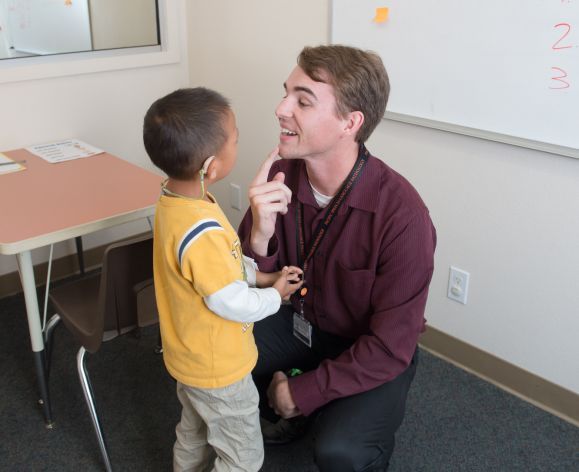Find Out How a Speech Pathologist Supports People with Voice Disorders
Find Out How a Speech Pathologist Supports People with Voice Disorders
Blog Article
Exactly How a Speech Pathologist Can Assist Improve Communication Skills
Effective interaction is a keystone of professional and personal success, yet lots of people encounter difficulties that impede their ability to share themselves plainly. A speech pathologist is outfitted to deal with these barriers through targeted evaluation and treatment techniques customized to each person's demands.
Comprehending Communication Disorders
Recognizing interaction disorders is important for acknowledging just how they impact individuals' capability to express themselves and involve with others. Communication conditions include a large range of difficulties that influence speech, language, and social communication, usually preventing reliable interaction. These disorders can emerge from various factors, including neurological conditions, developmental delays, physical disabilities, or mental issues.
Speech conditions might show up as difficulties in voice, fluency, or expression production, influencing just how words are obvious or spoken. Language conditions, on the other hand, include difficulties in understanding or utilizing language, which can hinder both non-verbal and spoken communication. Social communication problems are identified by problems in the pragmatic facets of communication, such as taking kip down discussion or understanding social cues.
The effects of interaction problems are profound, impacting not only the person's capacity to convey feelings and thoughts yet also their social connections, instructional chances, and general lifestyle. Recognition of these problems can foster empathy and assistance, motivating effective approaches for communication and involvement. Comprehending the complexities of interaction conditions is an important step in the direction of advertising inclusivity and addressing the requirements of those impacted.
Function of a Speech Pathologist
Speech pathologists often play a vital role in diagnosing and dealing with communication problems, using an array of evidence-based techniques tailored per individual's demands. These professionals deal with individuals across the lifespan, from children with speech hold-ups to grownups recovering from strokes or traumatic mind injuries. Their knowledge incorporates a range of interaction problems, consisting of expression, fluency, voice, and language problems.
In healing settings, speech pathologists utilize organized interventions made to improve interaction abilities. They might carry out techniques such as speech workouts, language video games, and social communication training to assist in improvements in expressive and receptive language abilities. Speech Pathologist. Additionally, they inform customers and their households concerning efficient communication methods and adaptive approaches to browse daily interactions
Beyond straight treatment, speech pathologists collaborate with other health care educators, caregivers, and professionals to make sure a detailed strategy to therapy. They advocate for clients by supplying sources and support, allowing individuals to attain their communication objectives and enhance their overall quality of life. As experts in the field, speech pathologists are crucial in fostering reliable interaction, advertising self-reliance, and boosting social participation for those with interaction obstacles.
Analysis and Medical Diagnosis Refine
The evaluation and medical diagnosis procedure conducted by speech pathologists normally involves a detailed analysis to determine interaction conditions accurately. This process starts with a detailed medical history, where the clinician collects essential info regarding the person's clinical, instructional, and developmental history. Comprehending the context of the person's interaction problems is vital for an accurate diagnosis.
Complying with the medical history, speech pathologists utilize standard examinations and informal analyses to examine various facets of communication, consisting of speech noise manufacturing, language understanding, meaningful language, and social communication abilities. These evaluations are tailored to the person's age and particular concerns, providing important data for evaluation.
Monitoring is likewise an essential component of the evaluation procedure, as it enables the clinician to see direct exactly how the individual communicates in all-natural setups. Furthermore, interviews with member of the family and teachers can offer understanding right into the individual's communication challenges throughout different settings.
Once the analysis is full, the speech pathologist synthesizes the searchings for to determine a diagnosis and recommend proper interventions. This extensive assessment procedure makes certain that people get targeted assistance tailored to their one-of-a-kind communication demands, laying the foundation for effective restorative methods.
Restorative Methods and Approaches
Countless therapeutic methods and approaches are used by speech pathologists to deal with a variety of communication problems successfully. One commonly made use of approach is expression therapy, which concentrates on fixing speech sounds via repetition and visual cues. This strategy is specifically beneficial for people with speech audio problems.
One more reliable approach is language intervention, which improves both meaningful and receptive language abilities. This may involve interactive tasks that advertise vocabulary advancement, syntax understanding, and conversational abilities. Additionally, speech pathologists usually use social skills training to improve pragmatic language capabilities, allowing people to browse social communications more efficiently.
Fluency shaping and stuttering modification strategies are specifically made to help those experiencing fluency disorders. These techniques assist customers create smoother speech patterns and handle the psychological and physical elements of stuttering.
Furthermore, augmentative and alternate communication (AAC) systems are used for individuals with serious communication problems. These systems, which can include motions, icons, or digital gadgets, offer vital support for effective communication.
Advantages of Speech Therapy

Furthermore, speech treatment can help in developing essential listening and understanding skills, fostering much better interaction in conversations. Individuals with cognitive-communication next disorders can likewise profit, as treatment concentrates on reinforcing memory and analytical abilities, necessary for reliable interaction.
Another vital aspect is the emotional support given throughout therapy sessions. Speech pathologists develop a secure setting, encouraging individuals to get rid of anxiousness and frustration related to their communication concerns. This support can bring about improved self-confidence and overall psychological wellness.
In addition, very early intervention through speech treatment can protect against further complications, making certain that individuals reach their complete communicative capacity. Overall, the benefits of speech treatment expand past plain speech improvement, positively influencing numerous dimensions of life for those impacted by interaction troubles.
Final Thought
In recap, speech pathologists play a vital role in dealing with interaction disorders with assessment, diagnosis, and tailored therapeutic interventions. By using evidence-based strategies, these experts improve people' speech and language abilities, promoting enhanced quality, fluency, and social interaction abilities. The advantages of very early treatment highlight the importance of seeking assistance from speech pathologists, as their experience can significantly boost communicative capacity, eventually bring about higher success in both professional and individual rounds.

Speech pathologists regularly play an important role in dealing with and identifying interaction disorders, using an array of evidence-based techniques customized to each person's requirements. As specialists in the area, speech pathologists are important in cultivating reliable interaction, advertising independence, and boosting social engagement for those with interaction challenges.

Report this page